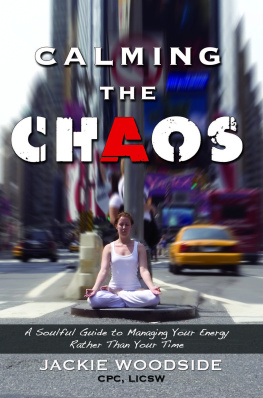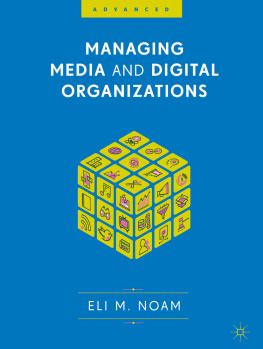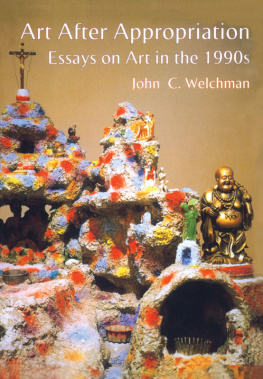Welchman - Managing Chaos Digital Governa
Here you can read online Welchman - Managing Chaos Digital Governa full text of the book (entire story) in english for free. Download pdf and epub, get meaning, cover and reviews about this ebook. year: 2015, publisher: Rosenfeld Media, LLC, genre: Business. Description of the work, (preface) as well as reviews are available. Best literature library LitArk.com created for fans of good reading and offers a wide selection of genres:
Romance novel
Science fiction
Adventure
Detective
Science
History
Home and family
Prose
Art
Politics
Computer
Non-fiction
Religion
Business
Children
Humor
Choose a favorite category and find really read worthwhile books. Enjoy immersion in the world of imagination, feel the emotions of the characters or learn something new for yourself, make an fascinating discovery.

Managing Chaos Digital Governa: summary, description and annotation
We offer to read an annotation, description, summary or preface (depends on what the author of the book "Managing Chaos Digital Governa" wrote himself). If you haven't found the necessary information about the book — write in the comments, we will try to find it.
Managing Chaos Digital Governa — read online for free the complete book (whole text) full work
Below is the text of the book, divided by pages. System saving the place of the last page read, allows you to conveniently read the book "Managing Chaos Digital Governa" online for free, without having to search again every time where you left off. Put a bookmark, and you can go to the page where you finished reading at any time.
Font size:
Interval:
Bookmark:
DIGITAL GOVERNANCE BY DESIGN
Lisa Welchman

Managing Chaos
Digital Governance by Design
By Lisa Welchman
Rosenfeld Media, LLC
457 Third Street, #4R
Brooklyn, New York
11215 USA
On the Web: www.rosenfeldmedia.com
Please send errors to:
Publisher: Louis Rosenfeld
Managing Editor: Marta Justak
Interior Layout Tech: Danielle Foster
Cover Design: The Heads of State
Interior Line Art: Michael Tanamachi
Indexer: Sharon Hilgenberg
Proofreader: Kezia Endsley
2015 Rosenfeld Media, LLC
All Rights Reserved
ISBN: 1-933820-88-8
ISBN-13: 978-1-933820-88-0
LCCN: 2014956861
Printed and bound in the United States of America
This book is dedicated to Rhys
a good son and a good person.
Its my good luck to be your Mom.
Anyone who has an interest and a hand in the strategic management of digital enterprise should read this book, particularly those who serve in bridging and management functions. This includes executive leadership, CIOs, and CMOs, as well as senior domain specialists such as user experience experts, enterprise architects, and content strategists.
People who work at interactive agencies and software integration shops that often have to execute projects amid digital chaos might also find Managing Chaos useful reading to help inform their projects and smooth the way for more streamlined project execution.
of Managing Chaos details a practical methodology for designing and implementing a digital governance framework.
gives a basic definition of digital governance and its core concepts.
explore more deeply each of the key aspects of a digital governance framework: digital team structure, digital strategy, digital policy, and digital standards.
discuss some of the dynamics around digital governance, including design factors, how to get the design job done, and what to do if your efforts dont get immediate traction in your organization.
of Managing Chaos highlights three different governance framework examples: a global multinational company, a government agency, and a higher education-type university. You can use these frameworks to understand some of the practical challenges inherent in designing and implementing your own digital governance framework.
This books companion website ( rosenfeldmedia.com/books/managing-chaos) contains a blog and additional content. The books diagrams and other illustrations are available under a Creative Commons license (when possible) for you to download and include in your own presentations. You can find these on Flickr at www.flickr.com/photos/rosenfeldmedia/sets.
rosenfeldmedia.com/books/managing-chaos) contains a blog and additional content. The books diagrams and other illustrations are available under a Creative Commons license (when possible) for you to download and include in your own presentations. You can find these on Flickr at www.flickr.com/photos/rosenfeldmedia/sets.
Digital governance is a discipline that focuses on establishing clear accountability for digital strategy, policy, and standards. A digital governance framework, when effectively designed and implemented, helps to streamline digital development and dampen debates around digital channel ownership. (See , The Basics of Digital Governance.)
I dont believe you. Every organization governs something. What you are really saying is that your organization hasnt decided to govern digital. That is one option, but it has consequences. Make sure that you are considering all the possible rationales for not governing digital before you default to this easy-to-articulate but hard-to-live-with conclusion. For more, see .
No, thats not a good idea. Creating a digital production silo is not an effective practice. It doesnt allow the digital team to understand the rich landscape of the business. And practically speaking, its very difficult to size a digital team when all the work is done in one place. For more information on a good digital team structure, see , Your Digital Team: Where They Are and What They Do.
No, governance does the opposite. It enables agility by clarifying roles and responsibilities and connections for a collaborative team. If you think about it, agile software methodology itself is highly structured with well-defined roles and responsibilities. Thats why it works so well in the right organizational applications. A digital governance framework, when properly designed, can enable not hinder agile development (see ).
In many ways, this book is just for you. A lot of organizations are led by digitally conservative executives (see .
Policies and standards are not the same thing. Policies are organizationally focused high-level statements established to manage risk inside an organization (see ).
No, standards can enable innovation and creativity. Standards are the bedrock upon which the Internet and World Wide Web rest. And, we can all agree that theres a lot of innovation and creativity happening on the Internet and Web. Without a framework of digital standards in your organization, yes, you will get some creativity. But, mostly, you will get a chaotic mix of disintegrated content and applications. Having standards and being able to enforce them will allow for rich, creative development (see ).
Iremember well the day I pitched Ciscos senior staff on leveraging the Web for all our business processes and for creating an organization, job descriptions, and clear roles and responsibilities to support our Web efforts. They agreed, looked around the room, and said, Which group should do it? (It could have been IT, customer service, or marketing.) Someone said, well, Sinton (marketing), you do it. And that was that. A clear decision, at least in the beginning, and the desktop PC (!) that housed Ciscos website was delivered outside my office along with the person managing it.
And we were off and runningsoon envisioning Cisco as a global networked business where the Web improved relationships for all of our business constituents (prospects, customers, investors, suppliers, employees, etc.). It was somewhat easy at first to maintain the presentation layer (now called UX) and core functions, such as registration databases, content management, and search. We built them from scratch and had a mandate from our CEO to manage them. Ciscos embrace of the Web as a core business strategy was both a strength and a weakness. With so much embracing, there began turf wars and disintegration that played out, sometimes very clearly, on the customer, employee, and partner websites.
Font size:
Interval:
Bookmark:
Similar books «Managing Chaos Digital Governa»
Look at similar books to Managing Chaos Digital Governa. We have selected literature similar in name and meaning in the hope of providing readers with more options to find new, interesting, not yet read works.
Discussion, reviews of the book Managing Chaos Digital Governa and just readers' own opinions. Leave your comments, write what you think about the work, its meaning or the main characters. Specify what exactly you liked and what you didn't like, and why you think so.











